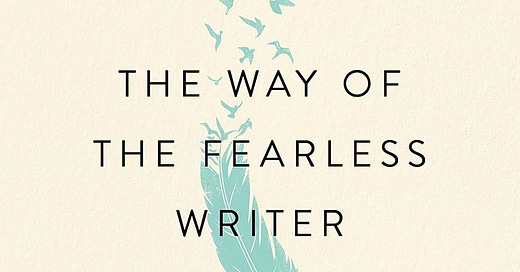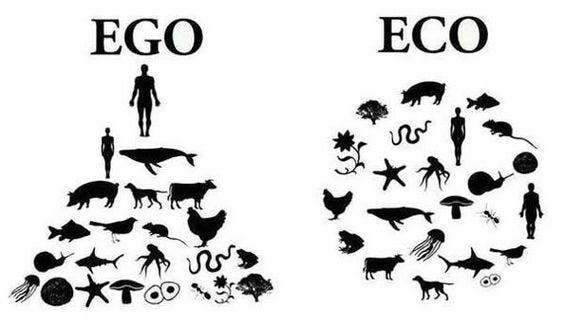Hello beloved reader,
As I move toward finalizing this book proposal, I often need to remind myself to cultivate courage. One way I do this is by returning to Beth Kempton’s brilliant book The Way of the Fearless Writer. While walking the other day and listening to the audio edition, I was struck again by this beautiful reminder (bolding is mine):
In the course of researching this book, I carried out an in-depth survey of over 1,100 writers from more than forty countries, which revealed that many of our fears are universal. We fear being seen, judged, ostracized, or ridiculed, and we fear both failure and success. All these fears arise from a worldview that sees us as separate from one another.1
The assumption behind each of these fears is that other people, even those we love, exist as judge, critic, and competition. This is totally natural in the materialistic society in which we live, which pitches us against each other with a “survival of the fittest” mentality. But it is devastating for our creativity and confidence.
If we can shift that worldview to one of connectedness, where nothing exists independently, and everything is delicately woven in with everything else, all those fears fade.2 We exist because of each other. We need each other to exist. We are waves in the same ocean. In Buddhism, this teaching—that all things are empty of their own inherent existence because they are all related to other things, causes, and conditions—is called 空 (kū), often translated as “emptiness.”
Kempton, Beth. The Way of the Fearless Writer: Mindful Wisdom for a Flourishing Writing Life (pp. 158-159). (Function). Kindle Edition.
This reframing of the Western worldview—from one of separation to one of interconnectedness—is, I believe, part of what the Dalai Lama was pointing toward when he said at the 2009 Vancouver Peace Summit that the world will be saved by Western women.
This shift—from separation to connection—is not just a personal reframe. It has cultural and evolutionary implications.
To succeed in the patriarchal structures of corporate America, many women have had to develop a strong Inner Patriarch.3 Yet increasingly, many are waking up to the realization that while this strategy may yield outer success, the rewards can feel spiritually arid.
May this above passage nourish your own creative expression—especially if, like me, you are practicing trust, receptivity, and the quiet wisdom of surrender. It speaks to a way of creating that feels less like striving and more like allowing—what I’ve come to recognize as an expression of the Divine Feminine.
After over a decade of studying the craft of writing—earning an MFA, reading widely, and consciously seeking out women’s voices—I’ve come to recognize two distinct energetic approaches to writing. These don’t necessarily align with gender, but they echo what we might label masculine and feminine archetypes.
The first, often associated with the masculine, is perhaps best captured by Hemingway’s famously stoic line:
“There is nothing to writing. All you do is sit down at a typewriter and bleed.”
In this approach, writing is framed as a solitary, punishing endeavor. Perseverance is the virtue; suffering is the measure of authenticity. In my experience, writers deeply identified with ego tend to describe their work this way.
The second approach—aligned with what I call the Divine Feminine—centers on receptivity, soul, and not identifying with ego. It arises not from effort, but from openness. Sometimes this is described as Flow.4
Joyce Carol Oates expressed it beautifully when she said:
“I’m simply the garden hose that the water flows through.”
J.K. Rowling has also described her writing process as feeling like the story already exists and she’s simply taking dictation.5 Similarly, Eckhart Tolle has shared that The Power of Now emerged from spontaneous responses to people’s questions—insights that came from stillness, which he later organized into a book.
This approach is not about striving or control. It’s about allowing. Listening. Trusting.
And it’s available to anyone—regardless of gender. Anyone who is willing to create spaciousness around ego—i.e. to not identify with ego—and to listen deeply. In this space, writing becomes less about control and more about communion. We are not the source of the story; we are the vessels through which it flows.
Of course, learning and practicing the craft of writing still matters. We study narrative structure, learn to write scenes, raise stakes, shape arcs, and select precise, specific sensory details. We gather the tools to make language sing. We hone discernment through feedback and revision. I explore this more in my Brevity essay, "On Useful Feedback and Silencing the Inner Critic."
But when it comes to what flows through us, I believe we serve the writing best by surrendering to something greater.
This is in tune with what I call the Divine Feminine—a way of writing that is a soulful, spiritual practice honoring the mystery and grace of creativity. I reflect more on this in another Brevity post, "On Writing, Joy, and Spiritual Practice."
So I plant this as a seed with you dear reader. Perhaps for any creative endeavor you may choose to participate in. Whether that be writing, painting, drawing, cooking, singing — it’s up to you.
May it take root in your creative life.
May you experience the joy of being a conduit for truth, beauty, and presence.
And may your creativity flow from beyond the conscious mind and ego.
This is my editorial: that is a view that exists in the Patriarchy, which is why we need to reclaim the divine feminine.
Another editorial by me: we all have an original medicine to share. It’s not a patriarchal hierarchical view of the world where there’s one at the top. You may have seen the image of eco versus ego, and EGO is with man at the top and every other sentient being below. Whereas ECO is the circle of all sentient beings in that circle.
The Shadow King: The Invisible Force That Holds Women Back by PhD Sidra Stone, New World Library, 2012.
Flow: The Psychology of Optimal Experience (Harper Perennial Modern Classics) by Mihaly Csikszentmihalyi, Harper & Row 1990.
https://stories.jkrowling.com/my-story/






Yes to writing from the Divine Feminine! To interconnectedness, to heartfelt and generous and authentic writing, to letting the creative work flow through us and into the world. Thank you for this reminder of why and how I write, Camilla, and for the recommendation of the Beth Kempton book, which I will order from my fabulous local bookstore, Paonia Books, after I move! Many blessings to you, and good wishes for the book proposal.
This has been a nourishing read. I love Oates image of being the garden hose. I hadn’t fully appreciated the distinction between ECO and EGO that was helpful to see visually. I am learning to listen and trust and to write from that basis.